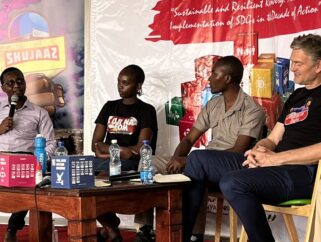Tanzanian youth: There may be money in agriculture, but there is no dignity [ARCHIVE]
- Agriculture & Environment
- 21 Jun 2016
In our most recent post on Tanzanian youth we discussed the central role that money plays in the motivations of young people. But it is not just the shortage of money defines their lifestyles & life choices. Belonging to a group or having a strong network of peers or family is also a key factor. With seven out of ten spending more than they earn each month, young people do several small jobs and exploit their networks to create an income. However small or temporary, every little helps.
You might expect that this relentless pursuit for extra income would lead young people to appreciating the opportunities in agriculture – especially since the Tanzanian government and international donors offer subsidies and free inputs, to reduce the need for start-up cash. Yet, just like their Kenyan cousins, young Tanzanians are far from embracing agriculture:
“First it will degrade their [young men] status, like leaving the urban area to go do agriculture in the village while in town there are good jobs of sitting in the office. They won’t go. And this is the reason why even the youth in the rural area leave their villages, knowing that here in the city there is good life other than agriculture.” (female focus group discussion participant).
“For us Zanzibarians when you tell us to go do agriculture it is like someone has insulted you and you can even take them to court.” (female field test participant).
According to our research, the root cause of this rejection is a lack of reliable sources of information about what constitutes agriculture, what kind of opportunities it can present, what capital investment it requires and what income it can generate. Young Tanzanians face three key challenges when it comes to considering agriculture as a potential career:
- Negative stereotypes about the sector and the people working in it
- Lack of understanding of agriculture as a value-chain
- Young people’s main source of information about agriculture is their parents
In our nationally representative survey of over 2,000 young people aged 15-24, we asked our respondents to describe agriculture in their own words. The mix of positive and negative sentiments in the wordcloud below is a representation of the mixed feelings about agriculture that young people also shared with us. Most agree that agriculture can be a source of food and money and can be relied on for survival, but it will involve heavy physical workload (digging dirt, planting seeds and keeping animals). It is seen as only for people who are not able to earn money through “good jobs” in an office.
One in two young people think that agriculture is mostly about production, i.e., it’s about cultivating crops and/or animals for personal or business purposes.
Such a narrow view of the sector causes young people’ to see the range of employment/self-employment opportunities available to them as similarly narrow: it’s a choice between growing crops in a dirty field or rearing dirty animals. When we ask what type of people are most likely to be involved in agriculture the top-three choices show the stereotype that agriculture is mostly for the “beggars [who] are not choosers”.
Parents are the most commonly mentioned source of information about agriculture. Together with other adults in the household, parents “rule” in the agriculture-related informational space.
Most parents are the embodiment of all the negative stereotypes about agricultural workers as being poor, unsuccessful producers of basic agricultural outputs. Seven out of ten Tanzanian households live below the poverty line (on $2 a day).
Young Tanzanians grow up surrounded by stereotypes about agriculture, which are reinforced through conversations with parents. Everything young people hear and see points to agriculture as a sector of small and unsure earnings but big and sure humiliations.
In the new cohort of young Tanzanians who value collective agency over individual agency, no “respectable” group would allow its member to engage in agriculture and risk damaging the image of the group. A wannabe farmer will most likely be expelled from the group and left struggling to find a new group to join.
But all is not lost. For the past year we have been focusing on enhancing young people’s perception of agriculture through a carefully crafted persuasion strategy that celebrates positive, role-model deviants across the Shujaaz media.
We showcase young agri-prenures not just excelling in their field but also being celebrated and endorsed by their peers and family: paying school fees, building a family home. We also show them enjoying the aspirational riches that their agricultural hustle rewards them with: the latest phone, designer clothes, a good-looking partner. In doing so we challenge the negative stereotypes head on and force young people to question their widely-held beliefs that agriculture is not for those who want a good life.
And our audience is responding… “DJ T is right – agriculture helps you make money.”


![The MABINGWA life, it’s greater than wildlife, it’s about our life. [ARCHIVE]](https://www.shujaazinc.com/wp-content/uploads/2020/01/BKM_0671-321x242.jpg)
![Shujaaz – turning footballers into farmers! [ARCHIVE]](https://www.shujaazinc.com/wp-content/uploads/2020/01/ea-cup-1-321x242.png)

